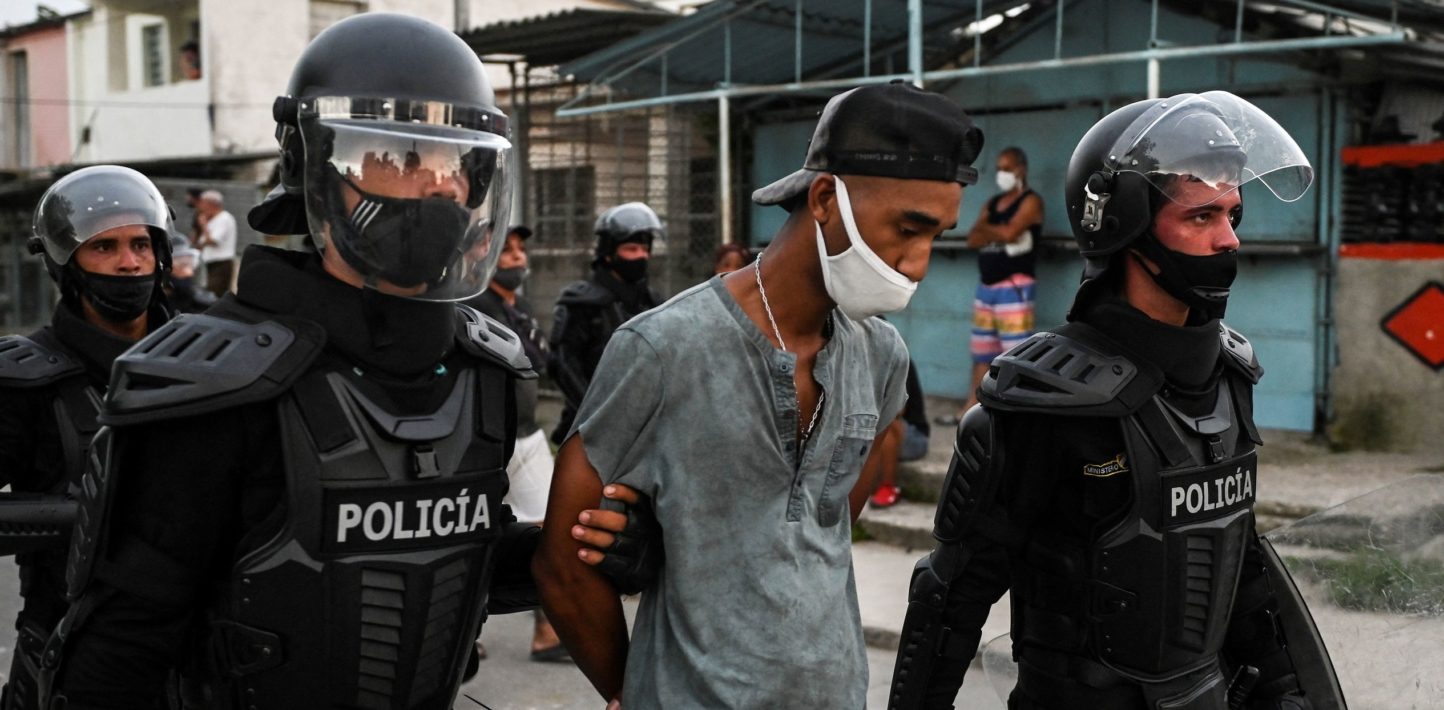11 July marks the first anniversary of massive and emblematic protests in Cuba. A year on, here are five things you should know about what has happened since and why we must pay attention.
1. The protests were a desperate cry for change in the country.
On July 11, 2021, thousands of Cubans spontaneously took to the streets in dozens of cities to protest, in numbers not seen in decades. People participated in the protests to demand a change in living conditions in Cuba. The protests responded not only to the shortages of food, personal hygiene items and medicine, the constant blackouts and lack of electricity, but also to the restrictive measures taken by the government to “control” Covid-19 transmission, and to the state’s historic policy of repression, which has violated freedom of expression and peaceful assembly for years.
2. Despite the demonstrations being peaceful, the authorities responded with repression and criminalization, in varying degrees, against almost everyone they encountered protesting.
During the protests, and in the weeks following them, the authorities arbitrarily detained hundreds of people without informing their families of their whereabouts, kept activists and independent journalists under extreme surveillance, and cut off the population’s internet access.
3. Cuban authorities repressed the protests using well-worn tactics of control.
One of the main tactics the authorities employed to repress the protests, and silence people who think differently, was the use of arbitrary detentions. The situation of artist and human rights defender Luis Manuel Otero Alcántara, one of six people named prisoner of conscience last year, is emblematic of how these tactics are employed, as he was detained after announcing that he would join the protests and, almost a year later, was sentenced to five years in prison just for exercising his right to freedom of expression.
These tactics to silence criticism of the government are not new, but rather reflect decades of repressive policies implemented by Cuban authorities. In addition to arbitrary detentions, other tactics include the interruption of internet service, violations of due process, ill-treatment, and unfair trials held behind closed doors. The Cuban authorities also resort to constant intimidation and surveillance using security agents for these purposes, as we documented in November 2021, in the context of the November 27 protests. Their attempts to silence diverse voices go so far as to exchange freedom for exile, as happened to Esteban Rodriguez and Hamlet Lavastida, who Amnesty International also named prisoners of conscience.
4. The Cuban government erroneously maintains that its actions are legitimate.
Despite using crimes inconsistent with international law (such as “public disorder”, “contempt”, and “instigation to commit a crime”) to criminalize those who protested, Cuban authorities insist that the manner in which they repressed the protests was appropriate. President Miguel Díaz-Canel himself called on the “defenders of the regime” to violently combat the people who had joined the demonstrations in the streets, because, according to the official version of events, the protests undermined “the constitutional order and the stability” of the socialist state. However, the facts speak for themselves: currently at least 701 people are known to remain deprived of their freedom, just for expressing their dissatisfaction with the situation in the country.
5. The international community continues to denounce the worrying lack of freedom of expression in Cuba.
However, despite vigorous efforts by governments and international organizations, the Cuban government refuses to allow international and independent human rights organizations into the country to document the state of human rights, and especially the situation faced by those arbitrarily detained.
While conditions inside Cuba have not improved a year on from the protests, stories have come to light that illustrate the courageous resistance of hundreds of activists, journalists, relatives of unjustifiably detained protesters, and people from all walks of life who have united their voices to continue fighting for their rights. Mothers of the victims have created viral videos demanding authorities to act to solve the deep economic crisis facing the country. Relatives have stood firm in the face of arbitrary arrests, threats and fines. Journalists and activists have left their homes to continue fulfilling their role of defending and protecting rights.
This 11 July anniversary reminds us that freedom of expression and the exercise of human rights could be a reality in Cuba. We reiterate our invitation to President Díaz-Canel and his cabinet to change repression for dialogue, and to promote plural and participatory spaces where the Cuban people can make decisions about the future of their country collectively, making the protection of human rights a priority.
Until that future arrives, Amnesty International will not stop defending those who raise their voices to build it.


